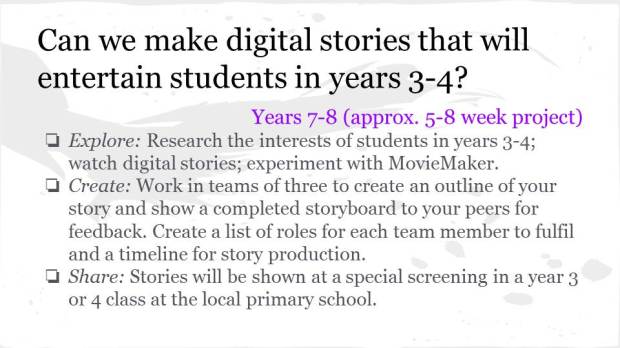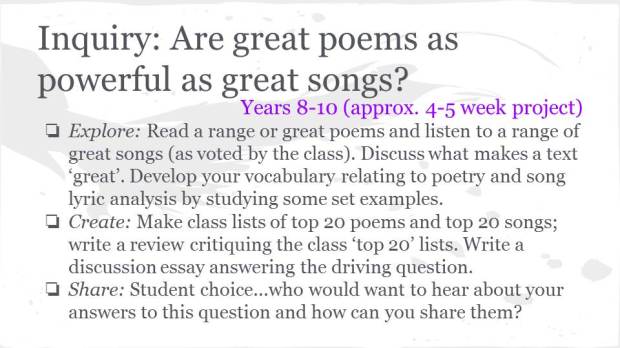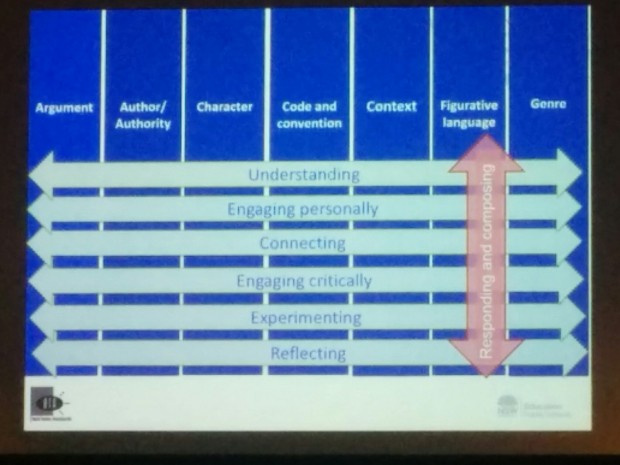Archive for July, 2016
PBL presentation at AATE conference
Posted by kmcg2375 in conferences, digital storytelling, education on July 15, 2016
Last week I presented material on using PBL in English at the AATE national conference.
Some English teachers up here in Brisbane gave me permission to show their work there, and I also shared some key links that helped me when I was beginning my PBL journey:
- The bie.org run down of what PBL actually entails
- Andrew Miller’s post on edutopia.org about writing effective ‘driving questions’
- Bianca Hewes’ post about how to ‘manage the mushy middle’ of a project
The big points about PBL that I highlighted by the end of the talk were:
- PBL involves a process of deep learning over time.
- PBL must involve an authentic audience beyond the teacher.
- PBL still involves small bites of teacher-delivered material, timed to support learning and project progress.
- PBL involves students in tackling real world concerns. Relevance is key!
Finally, I offered a range of my own ideas for PBL units for English. This frustrated non-teaching teacher would be very pleased to see others use/adapt/critique these project concepts…please report back if you do!

Digital storytelling PBL concept – by Kelli (CC BY-NC-SA)

Student research PBL concept – by Kelli (CC BY-ND-SA)

Poetry PBL concept – by Kelli (CC BY-NC-SA)

Shakespeare PBL concept – by Kelli (CC BY-NC-SA)
Teaching English using textual concepts
I know I just finished saying that my blog would mostly be used for PBL reflection in the near future.
But there is a new resource available for English teachers and English curriculum boffins that I must share immediately.
The English Teachers Association NSW, in partnership with the NSW Department of Education, have created a resource for programming in K-10 English.
It is organised in ‘stages’ (rather than in year levels), but once you get your head around stage 5 = year 9 & 10, stage 4 = year 7 & 8, and backward in pairs from there, you will get the picture.
The creators of this resource analysed the NSW English syllabus (which in theory maps on to the Australian Curriculum) to identify core concepts and processes implied by the curriculum documents.
The 15 ‘textual concepts‘ are:
- argument
- authority
- character
- code and convention
- context
- genre
- connotation, imagery and symbol
- intertextuality
- literary value
- narrative
- perspective
- point of view
- representation
- style
- theme
And the six ‘learning processes‘ are:
- understanding
- engaging personally
- connecting
- engaging critically
- experimenting
- reflecting
There are questions that jump to mind for me when looking at this resource, including:
- how are the ‘learning processes’ intended to interact/overlap with the ‘general capabilities‘ in the Australian Curriculum?
- where do ‘language mode’ and ‘medium of production’ fit into these concepts? Is it in ‘code and convention’, or…?
Overall I am excited by this contribution to English curriculum understandings. The conversations it will make possible between primary and secondary English are especially promising!
How might this approach to English subject content (knowledge and skills) interface with the curriculum (Australian Curriculum or otherwise) being used in your area? It’s been designed for NSW obviously, but could it have application beyond there?




Recent Comments